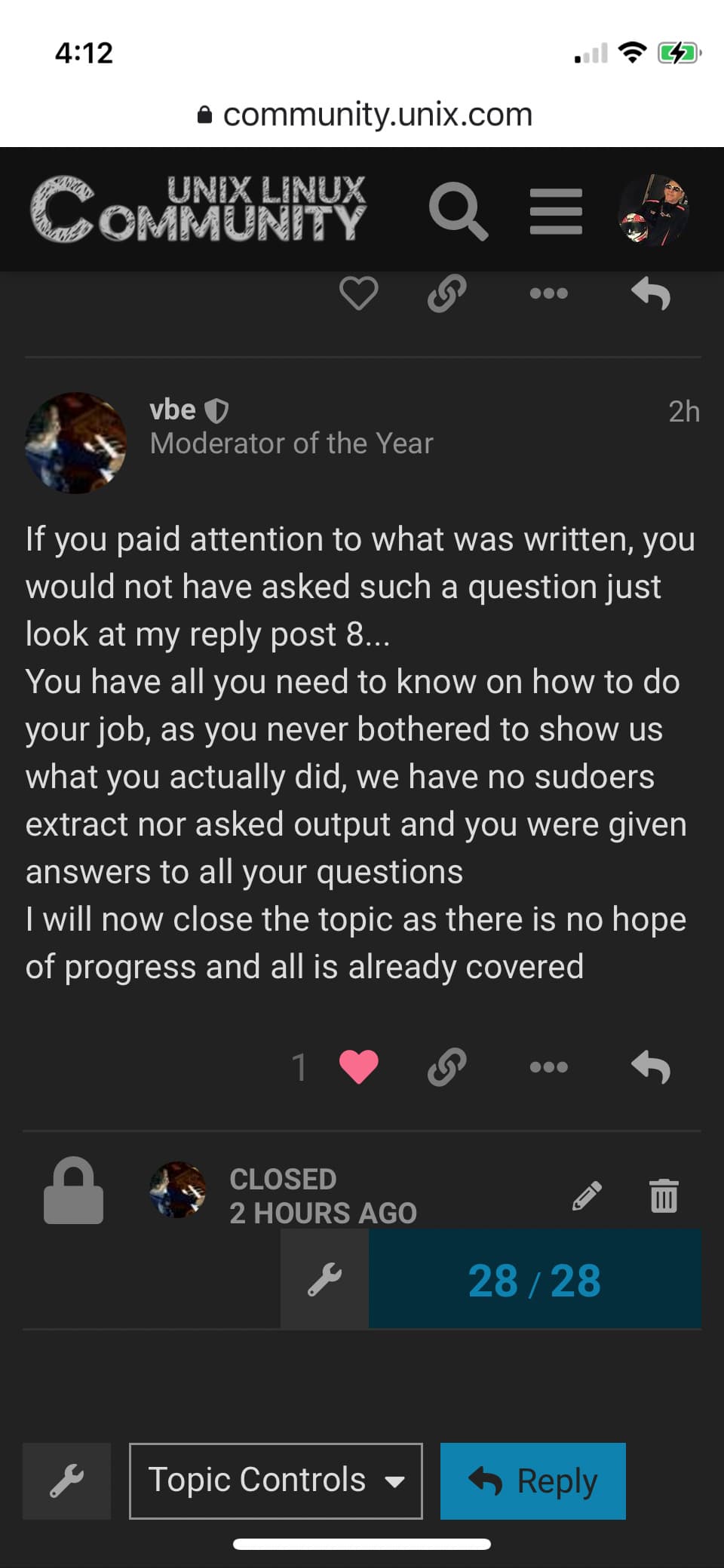I find it extremely interesting that a person who enjoys the right to be able to enter a room (whether it is virtual, as in this case) and silence everyone, may consider it correct to do so without anyone having requested it or without anyone having ever manifested in any way of discontent.
The fact that this person has previously written two lines of reply to the author of the thread (me) thinking that those few lines of his can fully satisfy those who have requested help, does not justify the fact of having arbitrarily prevented the continuation of a very interesting (from my humble point of view) polite exchange of opinions between highly prepared users and myself (absolutely unprepared).
From that thread I was trying to learn a lot to improve my approach to the subject in question, but someone with the power to do so has decided to limit not only my word, but also that of each participant of that discussion.
Finally, I point out that the thread in question contained absolutely no bad language, enjoyed calm tones from everyone and focused on a not too irrelevant topic: security.
In my country, decades ago, there was a character who behaved exactly in this way: he was the dictator Benito Mussolini.
I put an end to my observation, specifying that it is not my intention to create controversy in any way, but only to bring to light some facts.
I also apologize for using this space for my writing, but when you are subjected to censorship, you are forced to use the few tools available.
So let's go to the topic of the thread.
I wish I could tag the participants of the other discussion, to whom I had had time to respond before the discussion itself was childishly closed, in chronological order: @sbuckman1 @bendingrodriguez @masinick .
Finally I wish I could reply to @MadeInGermany (I was just typing when I was prevented from doing so):
Perhaps you have this in your sudoers (from SuSE Linux):
## In the default (unconfigured) configuration, sudo asks for the root password. ## This allows use of an ordinary user account for administration of a freshly ## installed system. When configuring sudo, delete the two ## following lines: Defaults targetpw # ask for the password of the target user i.e. root ALL ALL=(ALL) ALL # WARNING! Only use this together with 'Defaults targetpw'!This degrades
sudoto asu, where you must know the root password.
The preferred way is to have that deleted/disabled,
and allow specific commands for specific users, with their own password or even NOPASSWD.
So, these two lines, in the Arch Linux sudoers file, are commented out by default.
In all my installations, on the other hand, I am going to uncomment the first one and modify it as follows:
Defaults:%wheel targetpw
Also, I'm going to uncomment the line:
%wheel ALL=(ALL) ALL
These are the only changes I make to my sudoers files, on all my systems, to prevent a "simple" user from issuing commands that could compromise the system through his very weak password.
I am extremely keen to continue this discussion, as I am very keen to learn from those who know much more than me what the correct approach is to achieve the same result.
Regarding this topic I think I have therefore understood that it is not necessary to ask a user for the root password, since it is sufficient to insert it in the list of users who have the right to launch commands with sudo. I will research further by myself too.
Regarding the original argument of the closed thread instead, which I remember being the following:
makepkg first prompts to be launched by a simple user, after which, due to the -i option, it prompts for his / root password; this is not a problem if this command is launched "by hand" by the user, but it is problematic when this command is inserted in a script that must be automatically launched by the system in the background and therefore must not require any input from part of the user.
The solution I thought I would apply is the following:
Place an exception to the sudoers file related to makepkg, so that it does not ask for any password.
What do you think of this solution? Could it create problems? Do you think it is applicable?
Finally, I specify a few things:
- I am a novice user.
- At the same time, I am ultra-eager to learn from those who know more than me.
- I am 100% willing to provide whatever output is requested of me, and I do not understand in all honesty why I have been challenged this.
And, as usual, my system is Arch Linux, and the language I use is Bash.
Thanks for reading this far and forgive my outburst, but some things make my blood boil.
